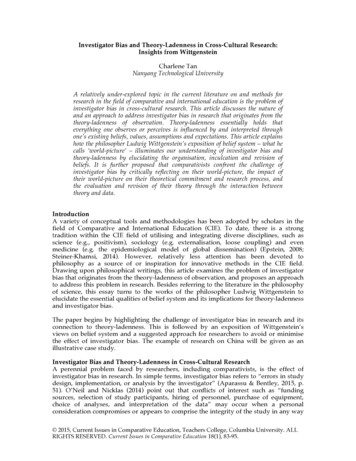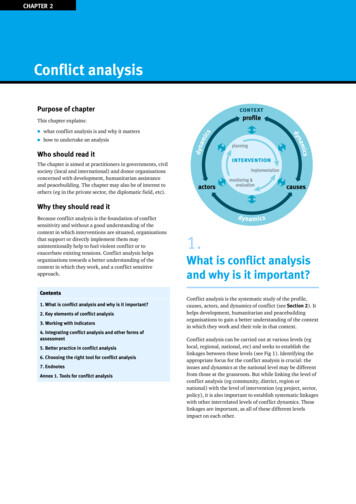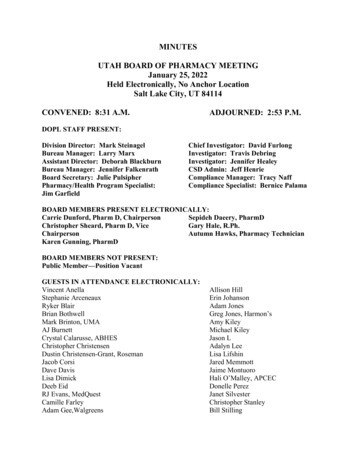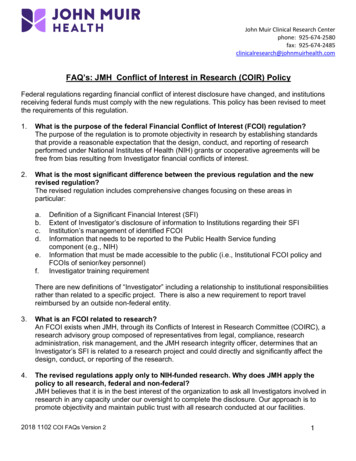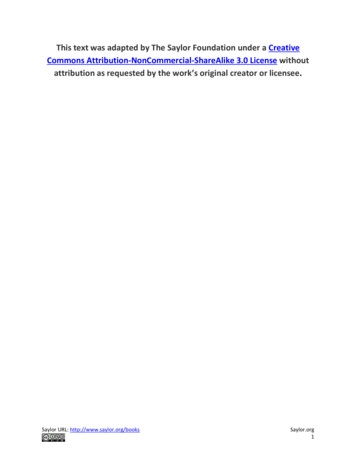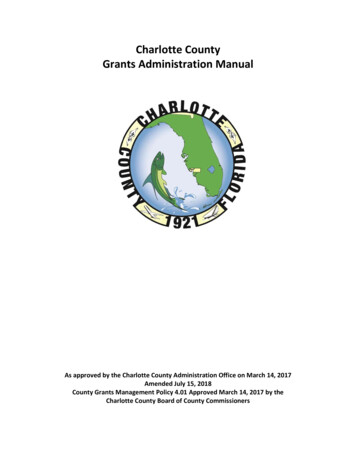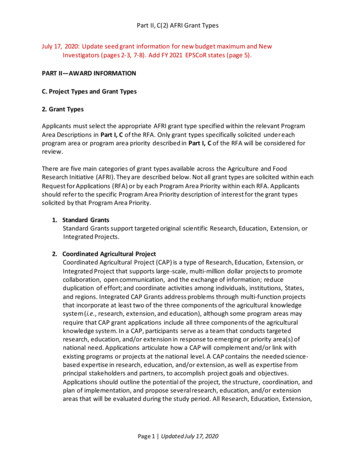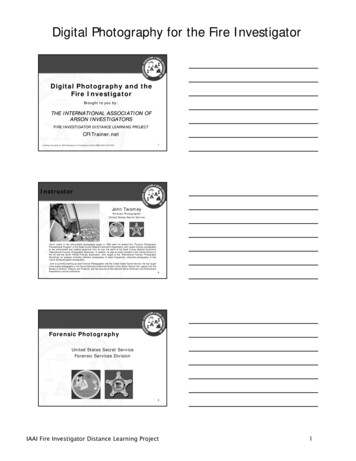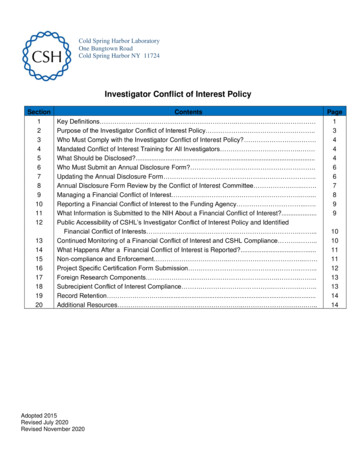
Transcription
Cold Spring Harbor LaboratoryOne Bungtown RoadCold Spring Harbor NY 11724Investigator Conflict of Interest tsKey Definitions . . Purpose of the Investigator Conflict of Interest Policy . .Who Must Comply with the Investigator Conflict of Interest Policy? .Mandated Conflict of Interest Training for All Investigators . .What Should be Disclosed?.Who Must Submit an Annual Disclosure Form? .Updating the Annual Disclosure Form . .Annual Disclosure Form Review by the Conflict of Interest Committee . .Managing a Financial Conflict of Interest . .Reporting a Financial Conflict of Interest to the Funding Agency . .What Information is Submitted to the NIH About a Financial Conflict of Interest?.Public Accessibility of CSHL’s Investigator Conflict of Interest Policy and IdentifiedFinancial Conflict of Interests . . .Continued Monitoring of a Financial Conflict of Interest and CSHL Compliance . .What Happens After a Financial Conflict of Interest is Reported?. .Non-compliance and Enforcement . . Project Specific Certification Form Submission . .Foreign Research Components . . .Subrecipient Conflict of Interest Compliance . . .Record Retention .Additional Resources . . . .Adopted 2015Revised July 2020Revised November 2020Page13444667899101011111213131414
1.KEY DEFINITIONS1.A clinical trial is a prospective or behavioral research study of human subjects that involves oneor more Investigators who directly observe a person or people, and/or who collect data to answera scientific or medical question about the safety or potential benefit of an intervention such asmedication, device, teaching concept, training method or behavioral change.2.Conflict of Commitment refers to situations in which an Investigator is dedicating time to OutsideActivities and Interests in excess of the time permitted by institutional policy (e.g., CSHL’sCommercial Relations Policy), or to Outside Activities and Interests that may interfere with or detractfrom the Investigator’s primary responsibility to CSHL. The issue regarding Conflicts of Commitmentis not necessarily financial or potential bias in judgment, but rather whether an Investigator’scommitment of time and effort are inconsistent with his/her obligations and commitment to CSHLand its interests.3.Disclosure refers to the Investigator’s disclosure of Significant Financial Interests and OutsideActivities and Interests to CSHL.4.FCOI portal refers to the on-line database accessed through CSHL’s Intranet where Investigatorscan review the Investigator Conflict of Interest Policy, complete the mandated Investigator Conflictof Interest Training Tutorial, and enter Annual Disclosure Forms and Project Specific CertificationForms.5.Federally funded research or PHS-funded research means any research funded by the PublicHealth Service (PHS) of the U.S. Department of Health and Human Services and any componentsof the PHS to which the authority involved may be delegated, including the National Institutes ofHealth (NIH). Others federal agencies include the National Science Foundation (NSF), Departmentof Defense (DOD), and Department of Energy (DOE).6.Financial Conflict of Interest (FCOI) will be deemed to exist when CSHL’s Conflict of InterestCommittee reasonably determines that a Significant Financial Interest disclosed by an Investigatorcould directly and significantly affect the design, conduct or reporting of the Investigator’s research,including but not limited to PHS-funded research, but with the exception of research funded throughPhase I support under the Small Business Innovation Research and Small Business TechnologyTransfer programs. Phase II SBIR and STTR programs are not exempt like Phase I, and mustcomply with the regulation.7.Foreign component refers to the performance of any significant scientific element or segment ofa research project outside of the U.S., either by the recipient or by a researcher employed by aforeign entity, whether or not grant funds are expended.8.Foreign entity refers to an organization located in a country other than the U.S. and its territoriesthat is subject to the laws of that country, regardless of the citizenship of an Investigator at suchorganization.9.Research is considered to involve human subjects when an Investigator conducting researchobtains data through intervention or interaction with a living individual, or identifiable privateinformation about a living individual.10.Investigator refers to the Principal Investigator (PI) or Project Director (PD) and any other personregardless of title or position who is responsible for the design, conduct or reporting of research,and includes, by way of example, all PhDs, MDs, graduate students, non-faculty scientific staff atand above the level of research associate and any others deemed appropriate by CSHL’s Conflict1
of Interest Committee. Collaborative and visiting researchers and subrecipient Investigators whoare receiving federal funding awarded through CSHL may also be deemed Investigators and berequired to comply with this CSHL Investigator Conflict of Interest Policy.11.Institutional responsibilities mean an Investigator’s professional activities on behalf of CSHLincluding, but not limited to, research, research consultation, teaching, professional practice,institutional committee memberships and service on panels such as Institutional Review Boards orData and Safety Monitoring Boards.12.Manage means taking action to address, reduce or eliminate a Financial Conflict of Interest orConflict of Commitment so CSHL can ensure, to the extent possible, that those responsible for thedesign, conduct and reporting of research will be free from bias.13.Outside Activities and Interests means an Investigator’s outside activities and relationships, evenif not compensated and and/or not providng personal financial benefit. Outside Activities andInterests incorporate non-financial interests/relationships and include, for example, the noncompensated provision of services for an outside entity (e.g., consulting, speaking, education,Advisory Board service, and Scientific Advisory Board service), and an Investigator’s intellectualproperty rights and interests relating to any patents or copyrights (other than those owned by CSHL)regardless of whether income has been received when the technology underlying the patent orcopyright is related to the Investigator research at CSHL.14. Regulation or FCOI regulation refers to 42 CFR Part 50 Subpart F, Promoting Objectivity inResearch (grants) and 45 CFR Part 94 (contracts). Refer to Section 19, Additional Resources,for links to these federal regulations.15. Report refers to CSHL’s report of identified Financial Conflicts of Interest to the applicable fundingagency affected by the FCOI. In the case of NIH funding, a report about the identified FCOI will beentered into the eRA Commons FCOI Module. Other funding agencies may have separate reportingrequirements, and these will be met as required.16.Research means a systematic investigation, study or experiment designed to develop or contributeto generalizable knowledge relating broadly to public health or agriculture, and encompasses basic,translational and applied research. Research includes any activity for which research funding isavailable regardless of the source, including a research award, career development award, centergrant award, fellowship award, infrastructure award, institutional training grant, program projectaward or research resources award.17.Senior/key personnel means the Principal Investigator or Project Director and any other personidentified as senior/key personnel by CSHL in the sponsored research application, progress reportor any other report submitted to the funding agency.18.Significant Financial Interest means a financial interest of the Investigator and the Investigator’sspouse or domestic partner and dependent children, alone or in combination, that reasonablyappears to be related to the Investigator’s institutional responsibilities for CSHL. Types of financialinterests include remuneration, equity interests in a publicly and non-publicly traded entity,intellectual property rights and interests, and reimbursed or sponsored travel. Refer to Section 5,What Should be Disclosed? for a more comprehensive description.19.Small business innovation research (SBIR) is an award designed to support projects from smallbusinesses having commercial viability.2
2.20.Small business technology transfer (SBTT) is a program under the SBIR program designed tofoster technology innovation through cooperative efforts between small businesses and researchinstitutions.21.Sponsored/Reimbursed Travel is any travel expense related to an Investigator’s institutionalresponsibilities that are either paid directly by a third party on behalf of Investigator so that the exactmonetary value may not be readily available or for which the Investigator is reimbursed by a thirdparty.22.A subrecipient is defined as all non-CSHL Investigators who are receiving funding awarded toCSHL, including but not limited to collaborators, consortium members, consultants, contractors,subcontractors, and subawardees.PURPOSE OF THE INVESTIGATOR CONFLICT OF INTEREST POLICYEffective interactions between research institutions, government, the private sector, and industry areessential to bring about the rapid application of scientific discoveries to address the needs of the nation and tomaintain the efficient translation of research findings. However, the resulting relationships, now encouraged inmany forms, are increasingly complex, and may involve financial interests that give rise to a Financial Conflict ofInterest (FCOI) through its potential to directly and significantly impact the design, conduct or reporting of anInvestigator’s research in return for a financial benefit to the Investigator or his/her immediate family.In addition, a Conflict of Commitment can arise if an Investigator’s efforts for CSHL are diminished bycommitments to outside endeavors. CSHL’s investigators owe their primary professional allegiance to CSHL,and their primary commitment of time and intellectual energies should be to CSHL’s research and educationprograms. Consistent with the foregoing, many U.S. federal agencies, including the National Institutes of Health(NIH) and National Science Foundation (NSF), require that their supported Investigators adequately discloseand report all of their outside professional activities, affiliations and appointments, whether or not compensated,and identify all resources made available in support of their research endeavors.A Financial Conflict of Interest or a Conflict of Commitment may arise even though no improper conductor unethical behavior has occurred. CSHL and its Investigators are responsible for identifying and then managingthese Financial Conflict of Interests and Conflicts of Commitment to strengthen accountability and transparency,promote research objectivity, and maintain the integrity of research findings and prudent stewardship of publicfunds.CSHL’s Investigator Conflict of Interest Policy was developed to comply with the specific 2011 federalrequirements defined in the United States Department of Health and Human Services’ Objectivity in ResearchRegulations 42 CFR Part 50 Subpart F (grants) and 45 CFR Part 94 (contracts). Section 20, AdditionalResources, includes links to the federal regulations. The U.S. Public Health Service (PHS) oversees andmonitors CSHL’s compliance with these regulations. PHS may inquire at any time before, during, or after asponsored research award about an Investigator’s Significant Financial Interest or Outside Activities andInterests, and CSHL’s review and response to such disclosure, regardless of whether the disclosure resulted inCSHL finding a FCOI.All CSHL Investigators are responsible for familiarizing themselves with the aforementioned regulationsso CSHL can effectively work with them to comply with these federal disclosure requirements. In turn, allInvestigators will be notified about CSHL’s conflict of interest requirements, as well as their disclosureresponsibilities under this Investigator Conflict of Interest Policy.CSHL’s Conflict of Interest Committee and Conflict of Interest Coordinator administer this Policy andemphasize compliance with its requirements, including the review of Annual Disclosure Forms, the training andmanagement of Investigators with regard to Financial Conflict of Interest and Conflict of Commitmentrequirements, and the timely identification, reporting and management of FCOIs. In those instances where a3
funding agency or sponsor has more stringent requirements and regulations relating to conflict of interest orconflict of commitment than those in CSHL’s Investigator Conflict of Interest Policy, the requirements andregulations of that funding agency or sponsor will take precedence.3.WHO MUST COMPLY WITH THE INVESTIGATOR CONFLICT OF INTEREST POLICY?CSHL implemented specific procedures for annual disclosure and review of all Significant FinancialInterests and Outside Activities and Interests so that as an institution the highest standards of integrity andobjectivity can be applied to the design, conduct and reporting of research carried out for CSHL. Accordingly,this Policy applies to all CSHL Investigators regardless of title or position who are responsible for the design,conduct or reporting of research and includes, by way of example, all PhDs, MDs, graduate students, non-facultystaff at and above the level of research associate and any others deemed appropriate by CSHL’s Conflict ofInterest Committee. Collaborative and visiting researchers and subrecipient Investigators who are receivingfederally funded research through CSHL may also be required to comply with CSHL’s Investigator Conflict ofInterest Policy.4.MANDATED CONFLICT OF INTEREST TRAINING FOR ALL INVESTIGATORSAll Investigators who are subject to the Investigator Conflict of Interest Policy are mandated to completethe Investigator Conflict of Interest Training Tutorial prior to engaging in research for or on behalf of CSHL, andat least every four years thereafter or immediately if (1) an Investigator is new to CSHL; (2) CSHL’s InvestigatorConflict of Interest Policy changes in a manner affecting Investigator requirements; or (3) CSHL finds that anInvestigator is non-compliant with CSHL’s Investigator Conflict of Interest Policy or an applicable managementplan.Subrecipient Investigators who are subject to CSHL’s Investigator Conflict of Interest Policy andparticipate in PHS-funded research are also required to complete the Investigator Conflict of Interest TrainingTutorial, which will be provided to them as an electronic copy because they do not have access to CSHL’s FCOIportal.Investigator training completion dates can be viewed in the FCOI portal and dates are also monitored byCSHL’s Conflict of Interest Coordinator.5. WHAT SHOULD BE DISCLOSED?Each of the following Significant Financial Interests and Outside Activities and Interests should bedisclosed on the Annual Disclosure Form and described on an Appendix Form to the extent they reasonablyappear to be related to the Investigator’s Institutional Responsibilities. In the interest of full transparency,Investigators should err on the side of disclosure.1.With regard to any publicly traded entity, domestic or foreign, the value of any remunerationreceived from the entity in the 12 months preceding the disclosure plus the value of any equityinterest held in the entity as of the date of disclosure that, when aggregated, exceeds 5,000. Remuneration includes salary and any payment for services not otherwise identified assalary, such as consulting fees, honoraria and paid authorship. Equity interests include stocks, stock options, or other ownership interests, as determinedthrough reference to public prices or other reasonable measures of fair market value.Note: Disclosure is not required for income from investment vehicles, such as mutual funds,ETFs, and retirement accounts as long as the Investigator does not directly control theinvestment decisions made in these vehicles.4
2.3.With regard to any non-publicly traded entity, domestic or foreign, (a) the value of anyremuneration received from the entity in the 12 months preceding the disclosure that whenaggregated exceeds 5,000, and (b) any equity interests in the entity (regardless of value) thatare held by the Investigator or his/her spouse or domestic partner or dependent children. Equity interests include stocks, stock options, or other ownership interests. If at the time of disclosure there is no reasonable basis for assessing the fair market valueor percentage interest in the non-publicly traded entity, the Investigator must fully describethe nature of the equity interest, including the number of shares owned, voting rights, etc.Financial interests received in connection with patents, copyrights, know-how or otherintellectual property rights (e.g., royalties, license fees, equity or other consideration) that whenaggregated over the prior 12 months exceeds 5,000, including consideration received pursuantto an agreement to share royalties related to such intellectual property rights.Note: Disclosure is not required for royalties, fees or other consideration paid to the Investigatorby CSHL for intellectual property owned by CSHL (i.e., not personally owned by the investigator).4.Any advisory relationship, consulting, outside teaching, or scientific/academicappointment including adjunct, visiting or honorary, with any domestic entity (other than CSHL),both paid and volunteer, as well as any unpaid appointment that provides the Investigator withaccess to, or in-kind support for, laboratory space, research materials, supplies, equipment, staffparticipation or living expenses.Note: Disclosure is not required for the following: Salary or other remuneration received from CSHL if the Investigator is currently employedor appointed by CSHL. Income from seminars, lectures, or teaching engagements sponsored by a U.S. federal,state or local government agency, a U.S. institution of higher education, a U.S. academicteaching hospital, a U.S. medical center or a U.S. research institute that is affiliated with aU.S. institution of higher education as defined in 20 U.S.C. 1001(a). Income from service on advisory committees or review panels for a U.S. federal, state orlocal government agency, a U.S. institution of higher education, a U.S. academic teachinghospital, a U.S. medical center or a U.S research institute that is affiliated with a U.S.institution of higher education as defined in 20 U.S.C. 1001(a).5.Any relationship with a foreign entity or government including, but not limited to, anyinvolvement with a government talent recruitment program or similar-type program (e.g.,Thousand Talents Program), both paid and volunteer, and any position or scientific appointmentstemming from a foreign government, which includes local, provincial or equivalent governments,government agencies, institutions of higher education, academic teaching hospitals, medicalcenters, or research institutes that are affiliated with an institution of higher education.6.All reimbursed expenses, gifts, gratuities, favors, lodging, or entertainment offers that whenaggregated over the prior 12 months exceeds 1,000. As a reminder, Investigators may not solicitor accept reimbursed expenses, gifts, gratuities, favors, lodging, or excessive entertainment forthemselves, his/her spouse or domestic partner or dependent children, alone or in combination,or for any person or organization that does business or has the potential of doing business withCSHL. Exempt from this prohibition are non-cash gifts of nominal value involving normal andordinary social amenities or sales promotions.5
7.Sponsored/Reimbursed Travel that meets the following criteria: travel within the United States received from a U.S. entity that when aggregated exceeds 5,000.Note: Disclosure is not required for Sponsored/Reimbursed Travel stemming from a U.S. federal,state, or local government agency, a U.S. institution of higher education as defined in 20 U.S.C.1001(a), a U.S. academic teaching hospital, a U.S. medical center, or a U.S. research institutethat is affiliated with a U.S. institution of higher education. travel outside the United States received from a U.S. or foreign entity* regardless of dollaramount.*Foreign entities include, but are not limited to, those stemming from a foreign company orgovernment, including local, provincial or equivalent governments, government agencies,institutions of higher education, academic teaching hospitals, medical centers, or researchinstitutes that are affiliated with an institution of higher education.Information needed for the disclosure of Sponsored/Reimbursed Travel: Identity of the sponsor/organizer.Month and year of the travel.Financial value by range of the travel.Value of any associated honorarium.Purpose of the travel.Destination of the travel.Time duration of the travel.Most scientific journals have implemented policies requiring authors to declare competing financialinterests in relation to work published in those journals. Such requirements, including how financial interests aredefined under those policies, are distinct from federal requirements relating to federally funded research andshould not be used as a guide to what information an Investigator needs to disclose under CSHL’s InvestigatorConflict of Interest Policy.6.WHO MUST SUBMIT AN ANNUAL DISCLOSURE FORM?At time of appointment/employment, all Investigators, including by way of example PhDs, MDs, graduatestudents, non-faculty scientific staff at and above the level of research associate and any others deemedappropriate, are required to enter an initial Annual Disclosure Form and associated Appendix Forms thatdescribe all Significant Financial Interests and Outside Activities and Interests related to their InstitutionalResponsibilities and then submit a new Annual Disclosure Form each subsequent year thereafter. Refer toSection 7, Updating the Annual Disclosure Form for additional information. Submitted Annual DisclosureForms are retained in the FCOI portal. Collaborative and visiting researchers and subrecipient Investigators whoare subject to CSHL’s Investigator Conflict of Interest Policy and participating in PHS-funded research are alsorequired to submit an Annual Disclosure Form, which will be provided as an electronic copy instead of throughaccess to the FCOI portal.7.UPDATING THE ANNUAL DISCLOSURE FORMAll Investigators are required to simultaneously submit a current, accurate Annual Disclosure Form andassociated Appendix Forms that identify and describe both existing and new Significant Financial Interests andOutside Activities and Interests related to their Institutional Responsibilities into the FCOI portal by the yearlyNovember 15th deadline. Subrecipient Investigators will complete an electronic Annual Disclosure Form basedon their particular funding cycle. Updated disclosures should also include any FCOIs identified on a project thatwas transferred from another institution.6
Investigators are required to promptly disclose Significant Financial Interests and Outside Activities andInterests to accurately reflect their external activities as follows:1. Disclose Significant Financial Interests and Outside Activities and Interests no later than at the time ofapplication for PHS-funded research.2. Within 30 days of acquiring and/or discovering a new Significant Financial Interest or Outside Activityor Interest, including through purchase, marriage, or inheritance.3. Within 30 days of a material change to a previously disclosed Significant Financial Interest or OutsideActivity or Interest.4. At least annually in accordance with the November 15 th deadline, during the period of an award.8.ANNUAL DISCLOSURE FORM REVIEWED BY THE CONFLICT OF INTEREST COMMITTEECSHL’s Conflict of Interest Coordinator will review the Annual Disclosure Form and any new or modifiedSignificant Financial Interests or Outside Activities or Interests disclosed throughout the year, and as such, mayrequest further information or clarification from the Investigator. CSHL’s Conflict of Interest Coordinator willreview each of the Investigator’s disclosures and determine whether a Significant Financial Interest or OutsideActivity or Interest is related to PHS funded research.If there are Significant Financial Interests or Outside Activities or Interests related to the Investigator’sfunded research, these relationships must be examined and dealt with according to CSHL and funding agencypolicies on conflict of interest. A personal financial interest with an entity would be reasonably considered relatedto an Investigator's research in circumstances such as the following:1. Entity sponsors research at CSHL in which the Investigator is directly involved.2. Entity has financial interests that could reasonably be considered to have a potential influence on thedesign, conduct or reporting of the Investigator's research.3. Entity has a reasonable possibility of being financially affected by Investigator's research.4. Entity makes monetary or in-kind gifts or loans to CSHL that benefit the Investigator's researchincluding a gift or loan of equipment.5. Entity makes a product that is under study in research in which the Investigator is involved.6. Entity licenses intellectual property from CSHL in which the Investigator has a financial interest.7. Entity has a Material Transfer Agreement to provide materials used in the Investigator's research orfor materials provided by the Investigator to the entity.8. Entity sponsors or makes a product that is under study in human subjects in which the Investigator isdirectly or indirectly involved.7
CSHL’s Conflict of Interest Committee, which is comprised of CSHL faculty members and administrators,reviews all Significant Financial Interests and Outside Activities and Interests to identify and address any issues.A FCOI will be deemed to exist when CSHL, acting through its Conflict of Interest Committee andfollowing the procedures described in this Investigator Conflict of Interest Policy, reasonably determines that aSignificant Financial Interest could directly and significantly affect the design, conduct or reporting of theInvestigator’s research. CSHL’s Conflict of Interest Committee reviews and analyzes the specific circumstancesof a Significant Financial Interest by taking into account such factors as the nature of the Investigator’srelationship to an outside entity, the dollar value of that relationship, and the overlap between that relationshipand the Investigator’s research. CSHL’s Conflict of Interest Committee may, if warranted, involve the Investigatorin determining whether a Significant Financial Interest is related to the research in question.A Conflict of Commitment will be deemed to exist when CSHL, acting through its Conflict of InterestCommittee and following the procedures described in the Investigator Conflict of Interest Policy, reasonablydetermines that an Investigator’s Outside Activities and Interests are inconsistent with his/her obligations andcommitments to CSHL and its interests. Conflicts of Commitment are handled in consultation with theInvestigator and, if necessary, his/her supervisor, and generally result in reduction or elimination of one or moreOutside Activities and Interests.9.MANAGING A FINANCIAL CONFLICT OF INTERESTIf a Significant Financial Interest is identified as a FCOI, CSHL’s Conflict of Interest Committee will takeaction to manage the FCOI by robustly reducing or eliminating the conflict by designing a management plan ormechanism appropriate for the specific situation. During the design process, CSHL’s Conflict of InterestCommittee may query CSHL’s Office of Sponsored Programs, the Internal Review Board, Commercial RelationsCommittee of the CSHL Board of Trustees or any other CSHL Committees, departments or individuals asnecessary to solicit additional information and alternate ideas. CSHL’s Conflict of Interest Committee will, asnecessary, accept, modify or reject the proposed management plan. After the management plan is approved byCSHL’s Conflict of Interest Committee, the Conflict of Interest Coordinator will forward a detailed letter to theInvestigator describing the management plan and its implementation.This written plan will require that the Investigator take certain steps according to guidelines approved byCSHL’s Conflict of Interest Committee. Conditions or restrictions that might be imposed to manage a FCOIinclude the following: Disclosure of the FCOI to lab personnel and collaborators.Disclosure of the FCOI directly to human subject research participants.Disclosure of the FCOI in publications, journals, and posters, etc.Disclosure of the FCOI to audiences at conferences and seminars.Monitoring of research, proposals and data by independent peer reviewers.Modification of the research plan.Removal of an affected Investigator from participation in all or the portion of the researchfunded by the entity affected by a Significant Financial Interest.Divestiture of a Significant Financial Interest by the affected Investigator.Limiting the dollar value of fees received and/or stock ownership.Severance of the relationshi
Health (NIH). Others federal agencies include the National Science Foundation (NSF), Department of Defense (DOD), and Department of Energy (DOE). 6. Financial Conflict of Interest (FCOI) will be deemed to exist when CSHL's Conflict of Interest Committee reasonably determines that a Significant Financial Interest disclosed by an Investigator
